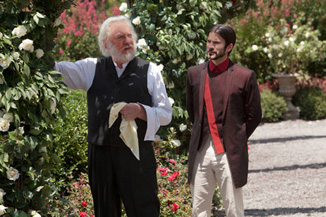|
|
Book vs. Movie: The Hunger GamesBy Russ BickerstaffMarch 28, 2012
If anything, the pacing of the film doesn’t take enough of the dramatic framing of the novel to heart to make this feel like a modern action film. The stillness of the whole thing extends beyond the establishing scenes pretty much through the rest of the whole film. It makes the story feel emotionally ominous without aspiring to much more than the basics of interpersonal human drama. To a certain extent, we’re not getting the larger feel of the emotional world where the story exits, which is kind of tragic, as even subtle hints of the world beyond the games would have gone a long way towards addressing the plausibility of the premise. That being said, as the movie is focused in on human emotion to the exclusion of all other concerns, the emotion reality of the story is brought across in reasonably compelling detail. The Verdict To date, the book has sold 2.9 million copies in print and another 1 million or more in the digital domain. This is by all accounts a very, very successful book that has become a success through appealing to its target demographic and probably some really, really clever marketing. Having been released a few years before the film, its reputation is likely to overshadow that of the film in the long-run due to its rapid-fire success early on. The film is irrevocably linked with the book, even though it’s likely to have been a bigger financial success over time. The film is actually more of an accomplishment as a work of pop art, having been able to rake in a huge amount of money as a drama-based action film. (As of opening weekend, it’s made $214 million worldwide on a movie budgeted somewhere in the vicinity of $80 million with an additional $45 million spent on advertising. Opening week looks to make more than $100 million in profit for the movie.) Perhaps this film will be further proof to Hollywood producers that the draw of the cinema still lies in the heart of a story’s appeal rather than the 3D IMAX gimmickry that they seem to have been occupying themselves with of late.
[ View other columns by Russ Bickerstaff ]
[ View other Book vs. Movie columns ]
[ Email this column ]
|

|
|
|

|
Sunday, April 28, 2024
© 2024 Box Office Prophets, a division of One Of Us, Inc.


